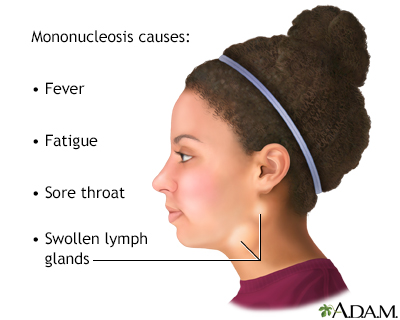Glandular fever Spread through saliva caused almost exclusively from EBV

Causes/Factors
- EBV virus colonisation, possibly at a older age than normal
Symptoms
- Fever
- Sore throat
- Fatigue
- Lymphadenopathy (swollen lymph nodes)
- Tonsillar enlargement
- Splenomegaly and in rare cases splenic rupture
Signs
- Swollen Lymph Nodes: Palpable and tender lymph nodes, especially in the neck and armpits.
- Splenomegaly and Hepatomegaly: Enlargement of the spleen and liver.
Diagnostic Tests
- Physical Exam: Evaluation of symptoms, particularly swollen lymph nodes, Sore throat, and fever.
- Monospot Test: this introduces the patient’s blood to red blood cells from horses. Heterophile antibodies (if present) will react to the horse red blood cells and give a positive result.
- Viral capsid antigen: tests for specific EBV antibodies. IgM for acute infection, IgG for immunity.
- Liver function tests: To assess liver function and detect any abnormalities.
- Throat swabs
Management
- Rest: Usually self limiting
- Avoiding Contact Sports: To prevent risk of splenic rupture due to enlarged spleen.
- Avoiding Alcohol: To avoid additional strain on the liver.
Complications/red Flags
-
Splenic Rupture: Enlarged spleen can be vulnerable to injury.
-
Haemolytic Anaemia
-
Chronic Fatigue: Some individuals experience fatigue for several weeks or months.
-
Avoid ampicillin & amoxycillin with EBV as may cause rash